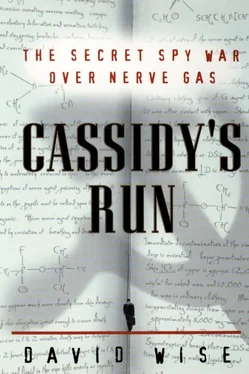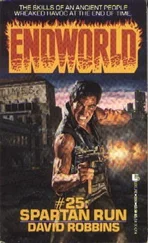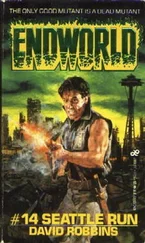The FBI men asked Cassidy if he would mind playing volleyball at 6 P.M.every Thursday at the Y in Washington. “I said, No, I wouldn’t mind. At that time they revealed who they were. It was clear I was being dangled. I knew I was bait, but I didn’t know for what purpose or what country was the target. I was excited about it.
“They told me I was to linger after playing and see what happened. They said, ‘You might be approached by someone with a foreign accent.’ I asked, What am I supposed to do then? Just go along with it, they said. And go in uniform. They gave me the code name WALLFLOWER.”
In this almost casual way, Joe Cassidy, with no previous training in intelligence or espionage, was launched on a career as a spy. He had no way to know that it was to become his life’s work.
CHAPTER: 4
ORANGE PEELS FOR BREAKFAST
Joe Cassidy’s earliestmemories are of the orphanage to which he was sent at age three, an institution with the grim, Dickensian name of the Home for the Friendless.
He was born on June25,1920, in Erie, Pennsylvania, the third of five children.His father was a foreman at the electric company.“My mother died from TB when I was about three years old,”Cassidyre counted.“My youngest sister, Maxine, died, I’m told, shortly after birth. I do not remember my mother or my young sister.I faintly recall being at the grave site at the burial of my mother, and some one gave each of us a ring.”
His father, suddenly a widower and unable to care for the children, placed Cassidy and an older brother and sister in the Home for the Friendless. Cassidy’s younger sister, Shirley, was taken in by a childless couple.
Cassidy and his siblings hated the orphanage. “My breakfast every morning all those years consisted of a bowl of milk with pieces of bread broken into it.” It wasn’t enough for a growing boy. He supplemented his diet by scavenging for scraps, even garbage. “I can remember finding discarded orange peels which I washed off and ate. I was hungry much of the time.”
Two stern overseers, Miss Moon and Miss Richardson, ran the orphanage. “We were given chores to do, and one of mine was to make beds. I would leave breakfast early, and on the way to the dorm I’d pass a cabinet where food was kept. The keys were almost always left in the lock. I would sneak in there and find something to eat.” Cassidy was so little at the time that he had to stand on a stool to reach the forbidden food.
“One morning, I took a banana. I had eaten about half of it when Miss Moon entered the dorm. I shoved the banana under the mattress. She came over to me and sat down, and the half-eaten banana squished through the peel and then through the metal springs and plopped on the floor. Miss Moon heard the banana fall and really gave me hell. And from then on, the keys were never left in the lock.”
The Home for the Friendless was a frugal place, and its officialdom had calculated that the orphans’ shoes would wear out more slowly if they were worn only in winter. “During the summers, we were made to go barefoot, which I hated. I was always stubbing my big toe. To this day I don’t like to go barefoot except in the shower or to bed.”
About the only happy moments for Cassidy were on Sundays, when his father visited. His father brought a bag of candy, but he was required to hand it over to Miss Moon or Miss Richardson, who divided it up among the children. Cassidy and his brother and sister complained to their father that they had little enough to eat, as it was. But there was no place to hide from the formidable Miss Moon, since any one coming to see the orphans was restricted to a community visiting area. “My Dad’s solution was to bring the Sunday funnies, and with me on his lap and my brother and sister beside me, he would open the paper in front of him and read us the funnies while we hid behind the paper and ate the candy.”
After five years in the orphanage, Cassidy and his siblings got a reprieve. His brother, Robert, was about to become a teenager, which meant he was too old for the Home for the Friendless. “My Dad persuaded his mother, who lived in Lock Haven, Pennsylvania, to come to Erie and provide a home for us.”
To Cassidy, by now age eight, his grandmother was like an angel of deliverance. No more sodden bread for breakfast, no more orange peels. “There was plenty of love and togetherness. We all finally got to know each other. In the orphanage, my sister lived with the girls, my brother was with the older boys, separated from me. We would see each other from time to time, but it wasn’t family.” At long last, in his grandmother’s house, Cassidy could enjoy a normal childhood.
For a boy who had literally been starved for years, the corner grocery store was nirvana. “We found out that the grocery store carried a running tab for families in the neighborhood. My Dad paid the bill every two weeks on payday. Well, I thought this was great—on the way to school in the morning I would stop in and get a dozen chocolate cookies. Next time, it was two bananas, or an orange and two apples.” The boy, still psychologically conditioned by his years in the orphanage, worried that someone might examine the grocery bill and confront him. But his father never said a word.
As a teenager growing up during the Depression years, Cassidy got into the usual boyhood mischief, none of it serious. When he was fourteen, his father remarried, and his grandmother moved to her own apartment. A year later, while in the ninth grade, Cassidy asked his father if he could quit school. “He finally agreed if I had a job.” Cassidy found one at four dollars a week, working for the Mehler Beverage Company up to sixty-five hours a week as a helper on a soft-drink truck.
Cassidy’s hometown, although the third-largest city in Pennsylvania, had none of the historic importance and social distinction of Philadelphia and none of the wealth and power of Pittsburgh. Situated on Lake Erie, in the far northwest corner of the state, Erie was geographically cut off from the rest of Pennsylvania. It was an industrial town with harsh, frigid winters that brought huge snowdrifts and that seemed to last half the year.
But if life in Erie was lackluster, and the hours on the job long, anything was an improvement over the orphanage. And Cassidy soon found work much flashier than hauling root beer. His best friend, Ray Dailey, knew Jack Parris, who owned a local nightclub. Although Prohibition had been repealed two years earlier, admittance to the Parris Social and Athletic Club was speakeasy style. “To enter you rang a bell at the top of the stairs, and an eight-inch slot would open, and a buzzer was pressed to let you in.
“They had slot machines, and pool tables in the rear, up over the Richmond Brothers clothier on State Street, and we went there often to shoot pool. Then we got to watching the floor show on Saturday nights. Soon it evolved to helping out at the bar when they were very busy. Washing glasses, et cetera. One night I was asked by a patron to fix a couple of Tom Collinses, and before long I was a regular bartender.
“Jack was quite an entrepreneur. He was raised in a poor Italian family and soon not only owned the club but a model and hobby supply store, which I ran for a while, and a neon-sign company. We became good friends, and a lot of times he would give me his Packard to drive some of the showgirls home.”
For a sixteen year old, tooling down State Street with showgirls in a fancy car was a definite step up from hauling soft drinks. But Cassidy did not entirely neglect the spiritual. “Although my family was Presbyterian, and we went to Presbyterian Sunday school, all my friends were Catholic. On Saturday night, we’d tend bar, work all night, and then go to mass. We ran two floor shows, the last one at two A.M. We’d close at five-thirty, wash glasses, and straighten up the place. We would leave the bar at five forty-five, run over to the cathedral a few blocks away for six o’clock mass, and then back to Clark’s restaurant for breakfast on Jack’s tab. I’ve gone to Catholic church ever since.”
Читать дальше












